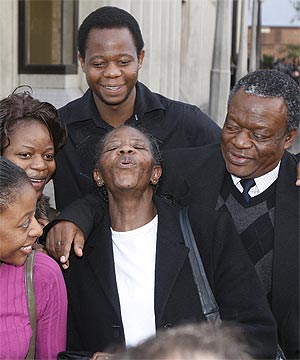The Press
May 22 2008; 05:00
Delight as Gwaze acquitted
by Jo McKenzie-McLean

PETER MEECHAM/The
Press
REUNITED: George
Gwaze, right, holds his wife, Sifiso, who sings a song of thanksgiving outside
the court. Their daughter Maggie is front left.
"Justice has
been done," George Gwaze said as he left the High Court in Christchurch a
free man yesterday.
Gwaze, 56, was
found not guilty on a charge of murder and two counts of sexual violation of
his 10-year-old, HIV-positive niece and adopted daughter, Charlene Makaza, who
died last year.
The jury took less
than five hours to deliver the not-guilty verdicts in front of a packed
courtroom, which included members of Gwaze's family, who jumped off their
seats, crying and shouting.
Justice Chisholm
called for calm as Gwaze's wife, Sifiso, collapsed with emotion, and
immediately discharged Gwaze.
"Mr Gwaze,
you can leave the dock. You are a free man," the judge said.
He excused the
jury from further service if they wished because the case had been difficult
and unpleasant.
He complimented
counsel Chris Lange, Jonathan Eaton and James Rapley on the professional way
the case had been handled.
Outside court, the
family danced, sang and praised God that Gwaze had been found not guilty.
"I am a free
man. Justice has been done. I am very relieved," Gwaze said.
"It's been hard.
My family have been supporting me very, very well - right from the word go.
Many people could not believe I would be charged with such serious
charges."
Inspector Malcolm
Johnston said police were "considering their options" after the
verdict, and had done "everything they possibly could" in the
investigation.
"It was an
extremely complex case. I don't want to make any further comment at this stage
while we consider our options," he said.
A Queen's Counsel,
Nigel Hampton, said the Crown did not have any right to appeal against an
acquittal but could appeal on a point of law.
"The only
appeal rights they have is if the judge has made a ruling on a point of law
that they think is wrong and they ask the judge to reserve that point for
appeal later. It's a very rarely used appeal right because it seldom fits the
situation," he said.
Gwaze was charged
after Charlene died in Christchurch Hospital on January 7 last year, doctors
suspecting sexual abuse.
The Crown alleged
she suffered anal and genital injuries that a series of medical witnesses said
were probably caused by force, and had died of suffocation.
Examination of
Charlene's underwear found in a washing machine showed Gwaze's DNA in sperm in
the crotch area. A scientist gave evidence it was unlikely to have been
deposited during laundering and was consistent with sexual activity.
Defence counsel
said her death resulted from an infection that overwhelmed her. She had been
infected with HIV since birth.
Evidence suggested
the sperm could have been the result of an "innocent transfer" in the
family's washing.
Outside court,
Eaton, for the defence, was critical of the police for failing to get a
specialist in HIV-related illnesses to review the medical aspects of the case.
In his summing up,
Eaton said comments from a South African professor with experience of HIV cases
had "dropped a bombshell" by showing similar factors between
Charlene's death and those of children with HIV in South Africa.
"It was a
case where the unusual circumstances that came together meant there would be
some benefit having the case reviewed outside of New Zealand," Eaton said
outside the court.
"Professor
Beasley (Christchurch paediatric surgeon Spencer Beasley) had a view early on
that perhaps it would be worth getting a South African specialist involved -
someone who might know more about these types of cases.
"For whatever
reason, the prosecution didn't go down that track. It really was, I guess, the
Gwaze family's faith in the justice system coming through very late in the
trial we do get a South Africa expert with experience who says this is a
possibility."
The case had been
"extremely difficult", Eaton said.
"You don't
get many cases where the defence say there wasn't a crime, that it was a death
by natural causes. That made it extraordinary setting itself aside from others
that courts normally have to deal with," he said.
"It was
difficult for police. They had evidence which, based on local advice, they came
to a certain conclusion about.
"That was
never accepted by the Gwaze family. Right from day one they stated their
position this was not a crime at all - and I think a speedy verdict from the
jury has shown the jury accepted that."
Gwaze's wife,
Sifiso, said she knew her husband was innocent.
"I knew my husband
was innocent right from the word go, so I am very happy with the outcome,"
she said.
"The defence
put their trust in us right from the word go. We were telling the truth, so I
am really happy."
George Gwaze said
he was "glad" for Charlene. "At last now she's happy," he
said.
The family would
spend the evening having a "big dinner" as well as "sing and
praise the Lord", he said.
The family
emigrated to New Zealand from Zimbabwe. Gwaze, a government veterinary officer,
wanted to escape the regime of Zimbabwean President Robert Mugabe and find a
better life and education for his family.
George Gwaze, who
holds two university degrees, one of them from England, was studying for New
Zealand veterinary qualifications at the time of his arrest, while working as a
factory technician.